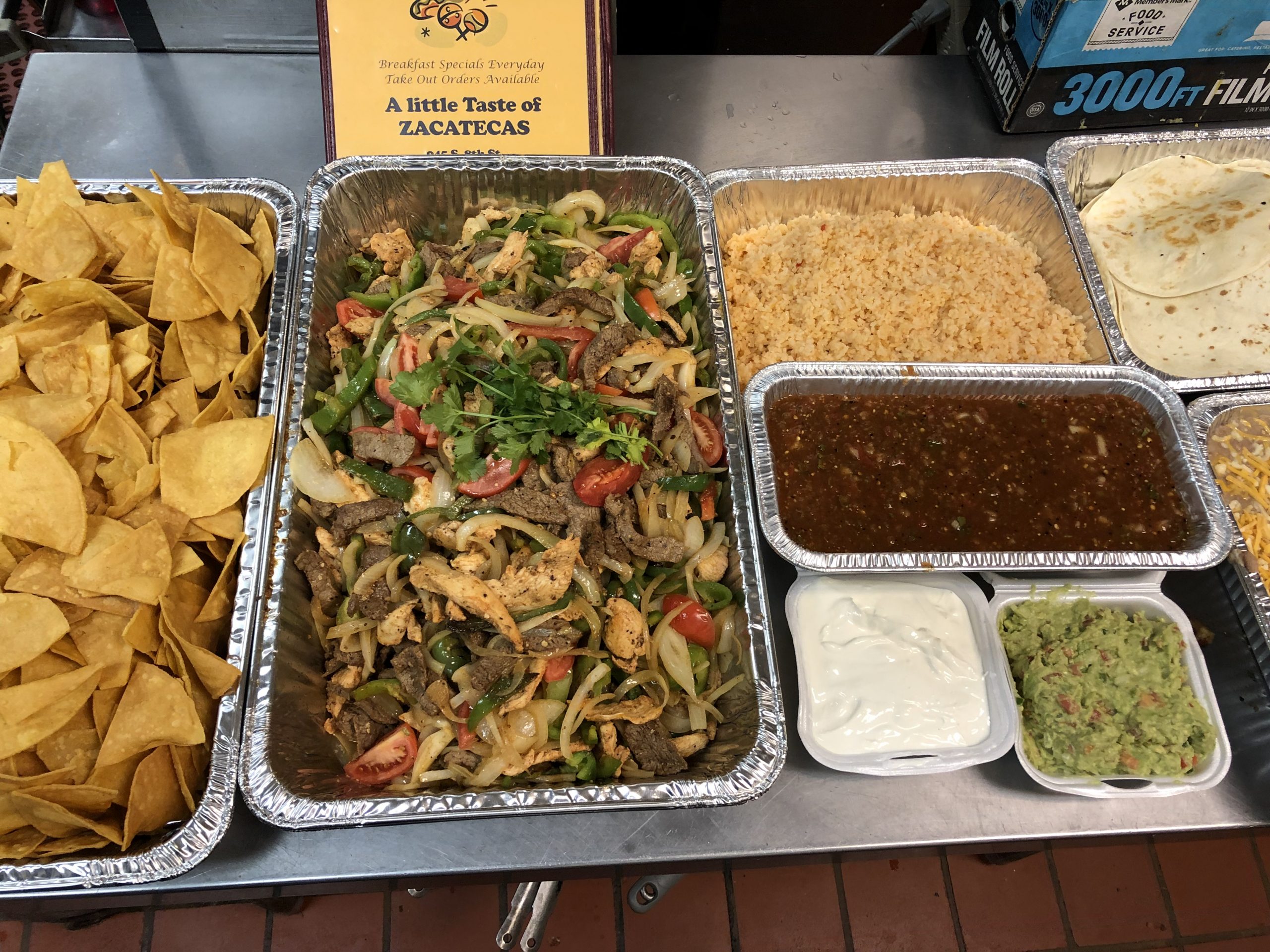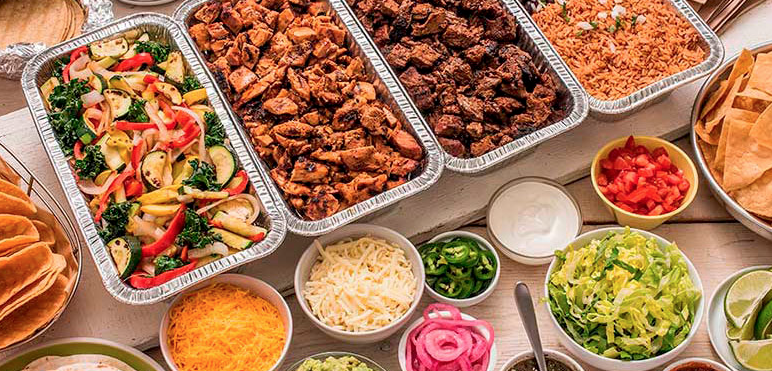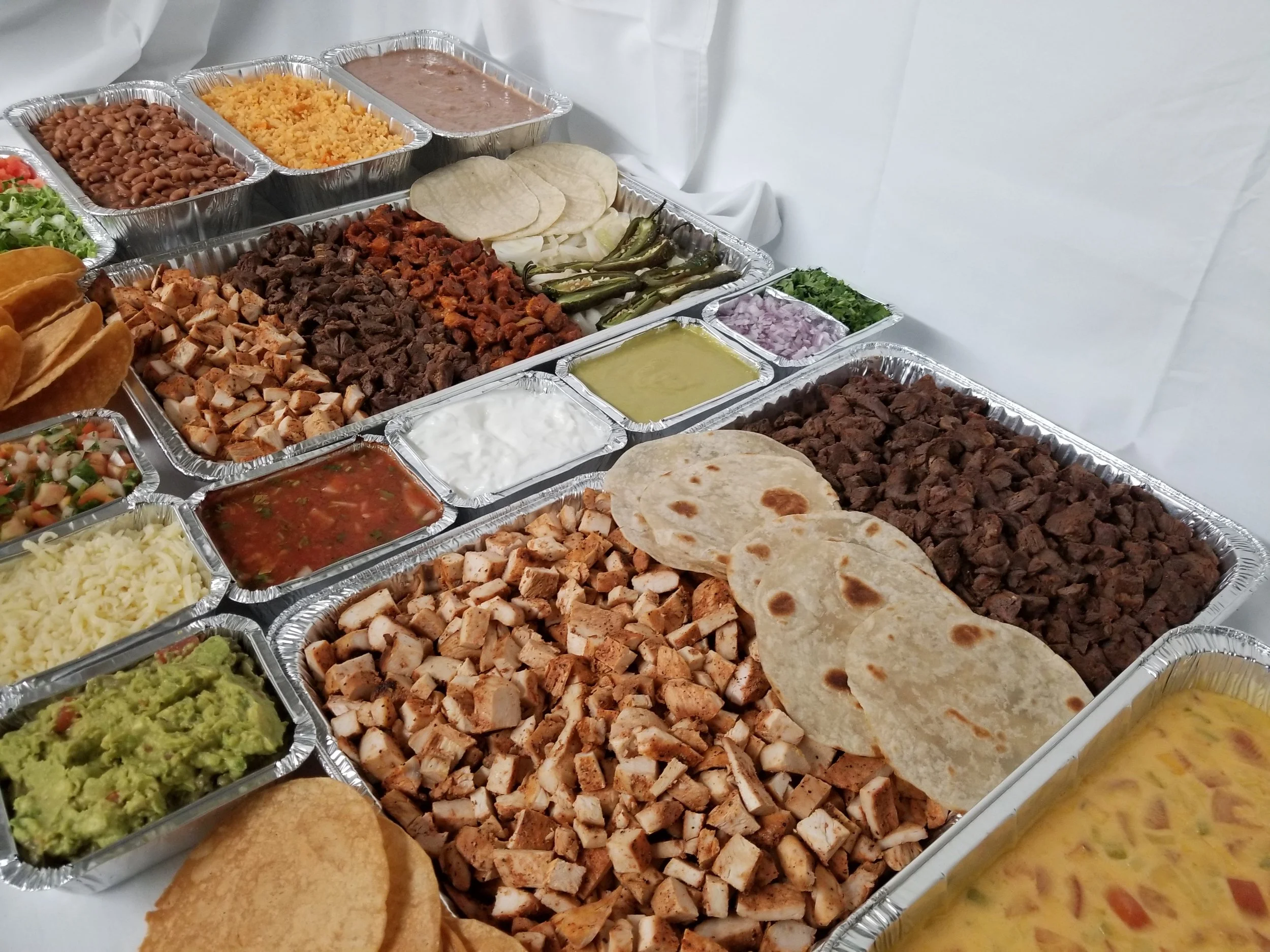Mexican catering food, a culinary tapestry woven with vibrant flavors and rich cultural heritage, takes center stage in this engaging exploration. From its humble origins to its global acclaim, we delve into the world of Mexican cuisine, uncovering its significance and popularity.
Prepare your taste buds for a tantalizing journey as we unveil the diverse offerings of Mexican catering, from mouthwatering appetizers to delectable desserts. We’ll explore the factors to consider when planning a menu, ensuring a harmonious blend of flavors that cater to every palate.
Introduction to Mexican Catering Food
Mexican catering food has a rich history and cultural significance. Its origins can be traced back to the indigenous cultures of Mesoamerica, who used corn, beans, and squash as the foundation of their diet. Over time, Mexican cuisine was influenced by Spanish colonizers, who introduced new ingredients and cooking techniques.
The result is a unique and flavorful cuisine that is enjoyed by people all over the world.
Cultural Significance
Mexican cuisine is an important part of Mexican culture. It is a way to connect with family and friends, and it is often served at special occasions. Mexican food is also a source of national pride, and it is often used to represent Mexico in international competitions.
Popularity
Mexican cuisine is one of the most popular cuisines in the world. It is estimated that there are over 50,000 Mexican restaurants in the United States alone. Mexican food is also popular in other countries, such as Canada, the United Kingdom, and Australia.
Types of Mexican Catering Food
Mexican catering food encompasses a diverse array of culinary delights that cater to a wide range of tastes and preferences. From tantalizing appetizers to hearty main courses, delectable side dishes to sweet treats, Mexican catering offers a comprehensive gastronomic experience.
The following is a comprehensive categorization of the various types of Mexican catering food, each with its unique characteristics and flavors:
Appetizers
- Chips and Salsa:A classic Mexican appetizer, crispy tortilla chips served with a variety of salsas, such as pico de gallo, salsa verde, and salsa roja.
- Guacamole:A creamy avocado dip made with fresh avocados, onions, tomatoes, cilantro, and lime juice.
- Quesadillas:Tortillas filled with cheese and other ingredients, such as beans, meat, or vegetables, and then grilled.
Main Courses
- Tacos:Corn or flour tortillas filled with various ingredients, such as meat, fish, vegetables, or beans.
- Burritos:Large flour tortillas filled with meat, beans, rice, vegetables, and cheese, and then rolled up and grilled.
- Enchiladas:Corn tortillas filled with meat, cheese, or vegetables, and then topped with a chili sauce and baked.
Side Dishes
- Rice:Mexican rice is typically cooked with tomatoes, onions, garlic, and cumin.
- Beans:Refried beans or black beans are common side dishes in Mexican cuisine.
- Vegetables:Mexican catering often includes a variety of grilled or steamed vegetables, such as zucchini, bell peppers, and onions.
Desserts
- Churros:Fried dough pastries coated in cinnamon sugar.
- Flan:A custard dessert made with eggs, milk, and sugar, and then baked in a water bath.
- Tres Leches Cake:A sponge cake soaked in three types of milk: evaporated milk, condensed milk, and heavy cream.
Planning a Mexican Catering Menu: Mexican Catering Food
Planning a Mexican catering menu requires careful consideration of several factors to ensure a successful and enjoyable dining experience for your guests. These factors include:
Dietary Restrictions
Catering to guests with dietary restrictions is crucial. Consider common allergies, such as gluten, dairy, or nuts, and prepare dishes that accommodate these needs. Clearly label menu items with allergen information to prevent any discomfort or health risks.
Budget
Determine the budget for your catering and stick to it. Consider the cost of ingredients, labor, and any additional services, such as rentals or staffing. Explore options that fit within your budget while still providing a delicious and satisfying menu.
Number of Guests
The number of guests will influence the quantity of food required. Estimate the number of attendees accurately to avoid running out of food or overspending on excess portions.
Theme or Occasion, Mexican catering food
Consider the theme or occasion of the event when planning your menu. A festive celebration may call for a more elaborate spread, while a casual gathering may prefer a simpler menu. Tailor your selections to complement the ambiance and tone of the event.
Presentation and Service of Mexican Catering Food

Presentation and service are crucial elements in Mexican catering. They elevate the dining experience, leaving a lasting impression on guests.
Visually appealing dishes entice diners, stimulating their appetite. Arrange dishes creatively using vibrant colors, textures, and garnishes. Consider serving dishes in traditional Mexican pottery or colorful bowls to enhance the authenticity of the experience.
Efficient Service
Efficient service ensures a smooth and enjoyable dining experience. Train staff to be attentive, knowledgeable about the menu, and prompt in serving dishes. Clear plates promptly and replenish drinks regularly to maintain a clean and organized dining area.
Mexican Catering Food in Different Settings
Mexican catering food has become increasingly popular in various settings due to its versatility, affordability, and ability to cater to diverse tastes. From weddings and corporate events to private parties and festivals, Mexican catering offers a range of options to suit any occasion.
Weddings
Mexican catering is a popular choice for weddings, especially those with a festive and vibrant atmosphere. The wide variety of dishes, from traditional tacos to modern fusion cuisine, allows couples to customize their menu to reflect their tastes and the preferences of their guests.
Corporate Events
Mexican catering is a cost-effective and crowd-pleasing option for corporate events. It offers a convenient way to provide a satisfying meal for attendees, while also allowing for flexibility in terms of menu selection and service style.
Private Parties
Mexican catering is a great choice for private parties, whether it’s a birthday celebration, anniversary dinner, or any other special occasion. The diverse flavors and textures of Mexican cuisine make it a popular choice for guests of all ages.
Festivals
Mexican catering is a staple at festivals and other outdoor events. Its portability and affordability make it an ideal option for vendors and attendees alike. The festive atmosphere of these events is complemented by the vibrant colors and aromas of Mexican cuisine.
Mexican Catering Food Trends

Mexican catering food is constantly evolving, with new trends emerging all the time. Some of the most popular trends include fusion cuisine, vegetarian and vegan options, and molecular gastronomy.
Fusion Cuisine
Fusion cuisine is a combination of two or more culinary traditions. Mexican fusion cuisine often combines traditional Mexican flavors with elements from other cuisines, such as Asian, European, or American.
Some popular examples of Mexican fusion dishes include:
- Tacos al pastor: Tacos made with marinated pork shoulder, pineapple, and cilantro.
- Enchiladas suizas: Enchiladas filled with chicken or cheese and topped with a creamy tomato sauce.
- Pozole verde: A traditional Mexican soup made with pork, hominy, and a green sauce.
Vegetarian and Vegan Options
Vegetarian and vegan Mexican food is becoming increasingly popular. There are many delicious and authentic Mexican dishes that can be made without meat or dairy products.
Some popular examples of vegetarian and vegan Mexican dishes include:
- Tacos de nopales: Tacos filled with grilled cactus paddles.
- Tostadas de ceviche: Tostadas topped with ceviche made with fresh fish or shrimp.
- Pozole rojo: A traditional Mexican soup made with pork, hominy, and a red sauce.
Molecular Gastronomy
Molecular gastronomy is a scientific approach to cooking that uses techniques such as spherification, emulsification, and foams to create innovative and visually appealing dishes.
Some popular examples of molecular gastronomy Mexican dishes include:
- Ceviche de mango: Ceviche made with mango, lime juice, and chili peppers.
- Tacos de carnitas: Tacos made with pork shoulder that has been cooked in its own fat.
- Pozole de camarón: A traditional Mexican soup made with shrimp, hominy, and a red sauce.
Detailed FAQs
What are some popular Mexican catering appetizers?
Chips and salsa, guacamole, empanadas, and quesadillas are all popular Mexican catering appetizers.
What are some common main courses served in Mexican catering?
Tacos, burritos, enchiladas, and fajitas are all common main courses served in Mexican catering.
What are some tips for planning a Mexican catering menu?
Consider dietary restrictions, budget, number of guests, and the theme or occasion when planning a Mexican catering menu.

